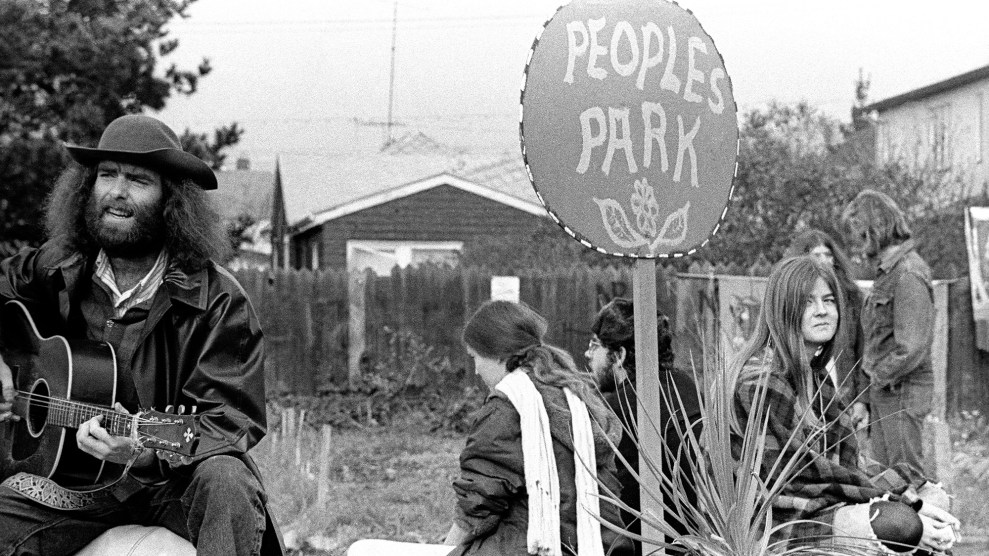If nothing else results from the conversation America is having, however dysfunctionally, about Rev. Wright and Obama’s speech, we can’t help but learn to take the black church seriously as the ultra-complicated reality it truly is. It’s not just about rousing gospel songs, old ladies in big hats, and ministers foaming at the mouth—all insulting sins even I have long committed.
I was raised a hard-core black Protestant and considered myself well versed in its contours, but I now find myself challenged and informed in ways I’d never expected. I never really understood the significance of the black prophetic tradition, or that it even was one. Nor did I properly understand or evaluate the schism that the modern black church’s focus on prosperity, vice prophecy, represents. That history is rich and troubling. It also situates the black church at a Gladwellian tipping point; will the current controversy silence the voice of black prophecy and strident critique and replace it with a ‘feel good, get rich’ religiosity to which whites won’t object?
From CNN this week:
The contemporary white church has largely accepted King as a religious hero. Yet some observers say there is one religious community that continues to shun King—the largest black churches.
Forty years after his death, King remains a prophet without honor in the institution that nurtured him, some black preachers and scholars say.
They also say King’s “prophetic” model of ministry—one that confronted political and economic institutions of power—has been sidelined by the prosperity gospel.
Prosperity ministers preach that God rewards the faithful with wealth and spiritual power. Prosperity pastors such as Bishop T.D. Jakes have become the most popular preachers in the black church. They’ve also become brands. They’ve built megachurches and business empires with the prosperity message.
Black prophetic pastors rarely fill the pews like other pastors, though, because their message is so inflammatory, says Henry Wheeler, a church historian. Prophetic pastors like the Rev. Jeremiah Wright, the former pastor for Democratic presidential candidate Sen. Barack Obama, often enrage people because they proclaim God’s judgment on nations, he says.
“It’s dangerous to be prophetic,” said Wheeler, …
Rev. Wright would certainly offer a hearty amen to that. And to this brilliant, beautifully written piece by Kelefa Sanneh in the April 7th New Yorker. I’ve read this very long piece three times now, along with Glenn Loury’s eloquently indignant response to Obama speech and…boy does my head hurt. I praised Obama to Katie Couric loud and long for his Black But More Than Black speech, and I now have to admit, as publicly as I entered the fray, that I didn’t know what I was talking about.
I wasn’t wrong entirely, just far from well informed enough to be taking stands. My analysis was simplistic and inadequate. It makes me nerd-happy now to be getting the schooling I need to be a worthy voice in this national consciousness-raising. I’m also happy to have helped enrage enough well-informed, fearless thinkers to set us all straight. We’ve all got a lot to learn about each other (not to mention, ourselves) and Hallejuah! we’re having the full frontal dialogue which alone will make ours a more perfect union.
I’ve always been baffled by blacks’ fervent embrace of Christianity during, and certainly since, slavery. Christianity justified slavery! Though I was raised in the church, mine wasn’t a Wrightian one. Our preachers were ‘jack leg’. No theological training, or even much beyond a grade school education, Jim Crow sharecroppers that they all were. Our only requirement was that they’d been ‘touched by God’ and ‘called to preach’. Drive a cab or work the assembly line by day, lead a flock come Sunday.
My religious training at Emmanuel Missionary Baptist, and others like it in the St. Louis inner city circuit, was about how dreary this life was, and that its only point was to persevere until we got our eternal reward in the great by and by. Far from prophecy and denunciation of white supremacy, classism, or god forbid sexism, we were exhorted to humble ourselves, wretches that we were, before an inscrutable God whose decision to stake us to the bottom of the totem pole was not ours to critique. That was blasphemy! Which was a word hurled at us routinely. My church years were the 1960s; my mother ignored the Movement and my father furiously opposed it. “Those knuckleheads need to take they fists out the air and get jobs!” Both were afraid that whites would be so enraged by the calls for change that we’d end up worse off. Back picking cotton, I guess. My five siblings and I were totally shielded from those wild political times; both the Movement and Vietnam raged throughout my childhood. I didn’t know a thing about either until I was in college. When change came, no one was as thunderstruck as my two uneducated manual laborers.
So you’ll understand why the prophetic tradition takes me by surprise. No one was taught to be as humble, self-effacing, grateful, silent, and well-mannered as an inner city black girl in the 60s, so the Wrights of the world seem…rude to me. Suffer in silence he does not. I abandoned my religion because it was so passive and determined to make me keep my peace in the world. What if I’d been exposed to a Wright?
Now I see the line that connects those ‘rude, kinda crazy’ Christian leaders one to the other—Sojourner Truth, Frederick Douglass, Dr. King…Jeremiah Wright? I’m not saying that Obama is now wrong and Wright is, you know, right. I’m saying that most of us have a lot more articles to read and a lot more nuances to incorporate into our opinions. Giving black religiosity its due as the voice of a historically oppressed group might be a good place to start. We have to ask ourselves—is black anger still legitimate? If no, discussion over. If yes…? As Jesse Jackson once quipped, “you can’t tell a man who’s hurting how to holler.”
I’m beginning to understand how the slaves and the Jim Crow’d had to embrace Christianity&mdashwhat else could get them through those terrible days? But ain’t nobody stupid; the hypocrisy of Christianity was quite obvious to them. They wouldn’t have been human had they not found a way to surrender into its soothing embrace while also fashioning it into a militant counter narrative that told the truth on America and racism. Why wouldn’t we be angry and open to ‘seeing’ America’s flaws?
You must read Sanneh’s piece. Here’s a long excerpt that will force you to engage with it in its entirety. Unless you already know everything about black religiosity. You know, like me:
“Christianity is the white man’s religion.” That was Malcolm X’s verdict, and though he meant it to be final, a generation of black Christian leaders decided to treat it as provisional. In 1969, a thirty-one-year-old theologian named James H. Cone published “Black Theology & Black Power,” a short, astringent book that Wright would use as a blueprint for Trinity. Cone proposed a reciprocal arrangement: just as the Black Power movement could find redemption in the Church, so the Church—dominated and distorted by generations of white men—could find redemption in the Black Power movement. He wrote that there was “a need for a theology whose sole purpose is to emancipate the gospel from its ‘whiteness’ so that blacks may be capable of making an honest self-affirmation through Jesus Christ.” And he argued that, since African-American suffering was such a powerful metaphor for the suffering of Christ, color-blind Christianity was a contradiction in terms. “To be Christian is to be one of those whom God has chosen,” he wrote. “God has chosen black people!”
…Cone was careful to explain that a black-centered Church need not be a black-separatist Church. And even the simplest phrases—”black people,” for instance—turned out to be slippery. It wasn’t about being “physically black,” he wrote. “To be black means that your heart, your soul, your mind, and your body are where the dispossessed are.” In his view, blackness was as radically inclusive as Christianity itself, and just as demanding. …
“It was the riots in Detroit, in Newark, both in ’67—that was what shook me,” he recounted. “I said to myself, ‘I have to have a theology that speaks to the hurt in my community. I want a theology that would empower people to be more creative. To be just as aggressive as they are in the riots, but more constructive.’ “
The doctrine he laid out was a response, too, to the paradox at the heart of black Christianity: the new religion of enslaved Africans was also the old religion of the American enslavers. In abolitionist tracts (like David Walker’s “Appeal”) and slave narratives, black writers struggled to find a way to distinguish between righteous Christianity and its monstrous opposite. Frederick Douglass, in an appendix to his “Narrative,” earnestly assures readers that he is not an atheist, then redoubles his attack on the theology of slaveholding America: “Between the Christianity of this land, and the Christianity of Christ, I recognize the widest possible difference—so wide, that to receive the one as good, pure, and holy, is of necessity to reject the other as bad, corrupt, and wicked.” (Or, rendered into cable-news crawl: “CONTROVERSIAL MEMOIRIST ATTACKS RELIGION. DOUGLASS: AMERICAN VALUES ‘WICKED.’ “)















